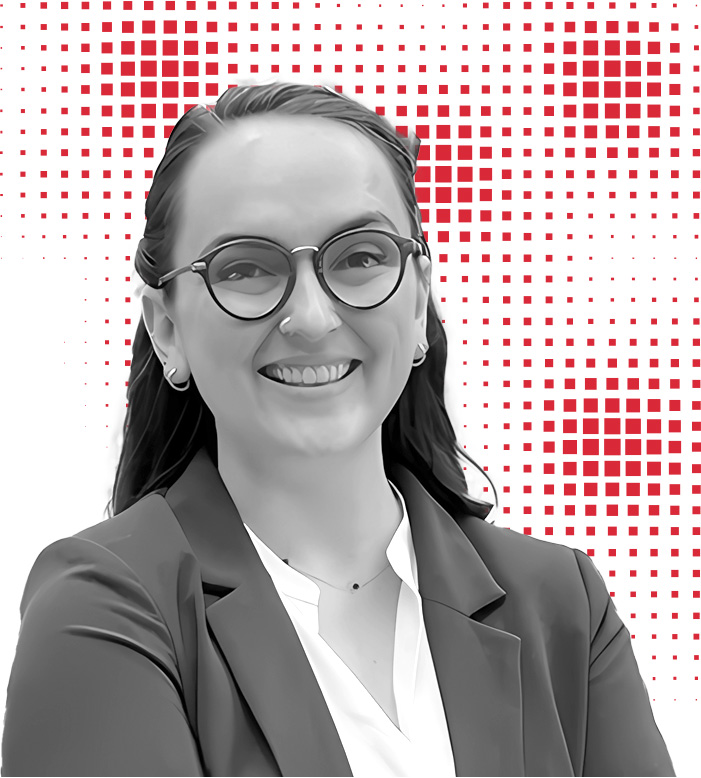Meet the Standard Error team
Kaitlyn Sims on how academic editing can complement a research career

Standard Error’s consulting editor Olivier Simard-Casanova connects with Kait Sims to chat about the complementarity between editing and research and her contributions as the “resident economist” on public policy research teams.
Olivier: Hello, Kait. You recently joined Standard Error Research Editors as an academic editor. Welcome! Can you tell us more about yourself and your career?
Kait: I’m an assistant professor of public policy at the University of Denver. Though I was trained as an applied economist, I do a lot of mixed-methods general social science research on topics like domestic violence, impacts of the prison boom, public health, and more. I love my job because I have the freedom to follow interesting questions and use different kinds of evidence to speak to really important and pressing public policy questions. This work also allows me to collaborate across disciplines with sociologists, psychologists, political scientists, criminologists, geographers, and more—being the “resident economist” on these teams lets me use my research skills in new ways.
I’ve also worked as a freelance editor since graduate school, and I have been with Standard Error since 2024 as an academic editor.
OSC: You’ve been doing scientific editing for several years now. What motivated you to start, and to keep doing it?
KS: I’ve always been a solid writer, and (to be honest) in grad school I needed something to take my mind off my own research! What I’ve loved about it is it keeps me fresh and up to date on new work coming out outside of my own corners of econ. It’s also so satisfying to take a manuscript that is already great and give it the last polish that can really make it shine.
OSC: What led you to join Standard Error Research Editors?
KS: After a while of doing freelance gigs, I was really looking for an organized way to do copy editing without having to recruit my own clients— Standard Error was perfect for that. I’m able to pick up jobs when they fit in my schedule and collaborate with a team to make a cohesive and high-quality product for clients.
OSC: On top of doing scientific editing, you are also a researcher. Can you tell a bit more about your research?
KS: I was trained as an applied microeconomist, but during grad school I kept finding that there were questions that simply didn’t have data or ethical ways to study using causal inference methods. Over the last four years or so, I’ve been developing my broader social science toolbox to be able to offer answers to tough questions about how policy changes the incidence of domestic violence (DV), both for individual households and at the population level. I’ve found a real passion in studying local DV service providers and emergency shelters–these first on-the-ground organizations are, for many survivors, the frontline care providers helping them move through violence. Yet, as a field, we have done so little comprehensive work on this industry and its impacts. I hope that my work can fill some of these gaps se we can better understand this vital care model and the future of DV service provision. What I love about the research I do is seeing immediately actionable policy implications that can improve people’s lives. Working with the Wisconsin Domestic Violence Housing First program evaluation, we’re offering real-time feedback to a large-scale policy intervention that directly impacts survivors of violence.
While DV and survivor services are the main pillar of my research agenda, I have other work on the carceral system, environmental health, and other public policy levers aimed at improving equity in the criminal-legal system.
OSC: Fascinating, thank you! Can you tell us a bit more about these secondary areas of your research?
KS: Absolutely! With colleagues in sociology and criminology, we’re currently studying the US prison boom (when the number of US prisons tripled in thirty years) and bust (recent trends of prison closures), with our work recently published in Punishment & Society and forthcoming in the Journal of Crime & Justice. We’re looking to compare our results from this research to findings on other arms of the criminal-legal system, such as the immigration and pretrial detention systems. Around 70% of people held in US jails are at the pretrial stage, meaning they’ve not been convicted of anything and are, in many cases, held because of the economic burden of cash bail. Serving any time in jail has enormous negative impacts on peoples’ employment, income, child custody outcomes, mental health, and more, so it’s a hugely important area for public policy reform.
My work on environmental health has largely focused on the impacts of agricultural intensification and land use change in the Brazilian Amazon and Cerrado. Our recent work, published in the Proceedings of the National Academy of Sciences, found evidence that increased soy production–and specifically intensified use of chemical inputs like pesticides–are associated with increased child mortality from acute lymphoblastic leukemia. We see this paper as being just the tip of the iceberg, as it focuses only on pediatric cases, fatal cases, and one type of cancer. I’m hoping to continue this line of work soon.
OSC: Finally, can I ask what are your favorite activities to spend your spare time on?
KS: I’m an absolutely huge knitter—my weekends are mostly spent snuggling my dog and cat on the couch while I knit up my dream wardrobe (usually while watching some super juicy reality TV—the Netflix dating universe is addictive).
You can learn more about Standard Error Research Editors’ team here.


